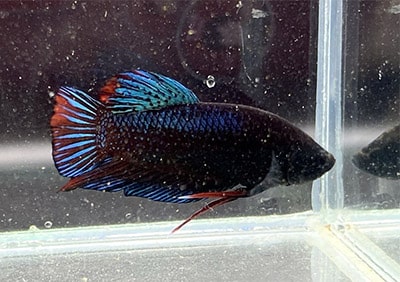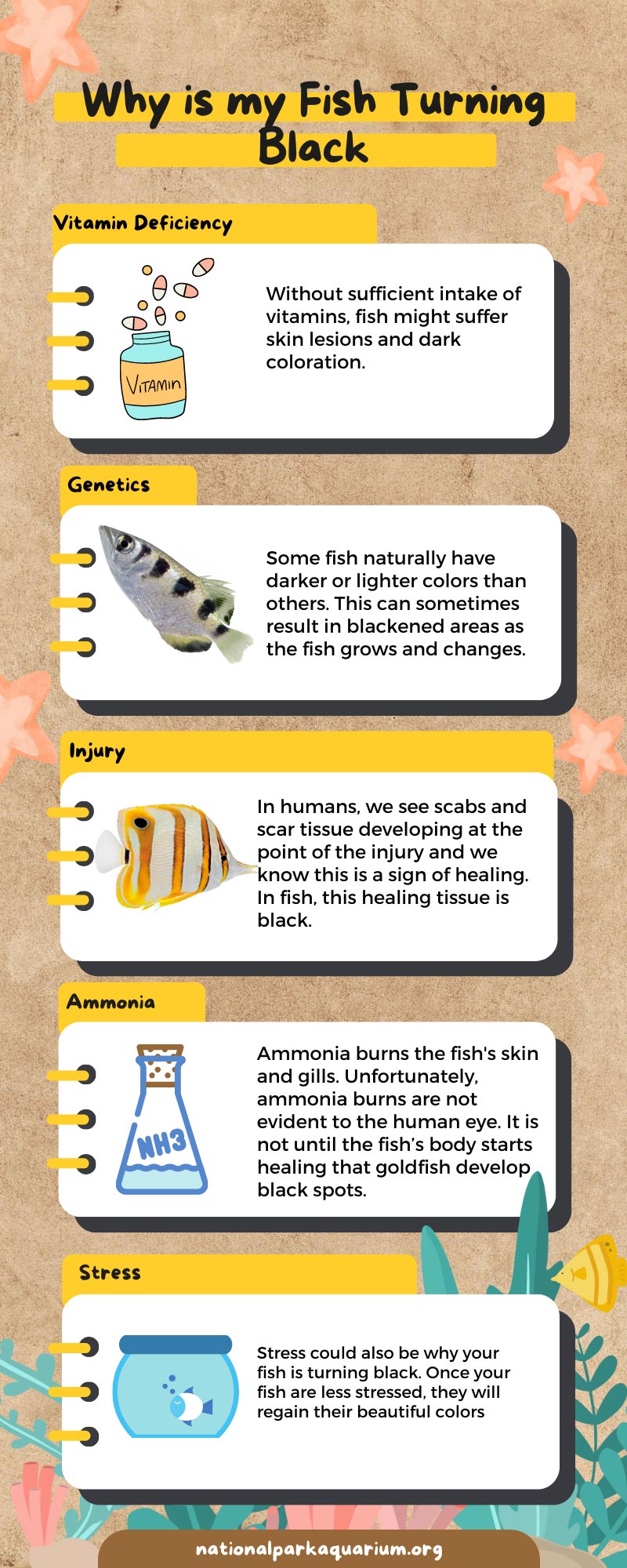You might find it alarming when visiting your fish tank one morning to notice that one or more of your fish are turning black. Indeed, some signs indicate it’s pretty dangerous, while many times, it’s not a cause for concern.
In most cases, blackened fish are simply adjusting to their new environment. However, you should do a few things to ensure that your fish remain healthy.
In this article, we’ll delve into the reasons behind fish turning black and the ways to look after them. Plus, we’ll share some advice on how to keep this from occurring down the line.
Reasons Why Your Fish Turn Black

1. Genetics
One possible cause of blackened fish is genetics. Some fish naturally have darker or lighter colors than others. This can sometimes result in blackened areas as the fish grows and changes.
Therefore, goldfish or any fish that is mixed breed will show such a unique change of color. Even the purebred ones might have slight black streaks on their bodies. And it’s absolutely normal.
There is nothing that can be done to change the genetics of a fish, so if you think this is the reason why your fish is turning black, there is no need to worry. This is simply the way your fish was born, and it will not harm the fish in any way.
2. Vitamin Deficiency
Another possible reason your fish is turning black is that it could simply suffer from a vitamin deficiency. Without sufficient intake of vitamins, fish might suffer skin lesions and dark coloration.
If you think your fish might be lacking vitamins, it is important to work with your vet to identify the problem. You should provide them with the nutrition they need during their daily diet to prevent this issue from happening.
3. Disease

Melanoma
One possible reason your fish is turning black is that it could suffer from a melanoma disease. Melanoma is a type of cancer that causes the overproduction of the pigment melanin in the body.
Melanoma is a severe disease that can be fatal if left untreated. If you think your fish may have melanoma, it is crucial to take it to the vet for a diagnosis and treatment.
Plaga Negra
Plaga Negra is a disease that affects freshwater fish. It is caused by a parasitic fungus called Aphanomyces invadans. This fungus attacks the skin and fins of the fish, causing them to turn black.
Ink Disease
Ink disease is a condition that affects saltwater fish. It is caused by bacteria that produce a dark pigment called melanin. This pigment coats the skin and fins of the fish, causing them to turn black.
4. Injury or trauma
Another possible reason your fish turns black is that it could be injured or traumatized. When fish are injured, their bodies release a hormone called cortisol.
Cortisol helps to promote the healing process by increasing blood flow to the injury site and reducing inflammation. However, cortisol also causes the body to produce more melanin. This can cause the fish’s skin to turn black around the injury area.
5. Excessive Ammonia
The presence of ammonia can turn the fish black, mostly starting on its fins and then spreading through its body.
You should test the level of ammonia in the tank water and determine the right method to remove it. If the result indicates there is >0 ppm ammonia in the water, use a filtration system to remove it. If the result reaches 2 ppm, it can be lethal.
6. Age
As fish age, their bodies produce less and less melanin. This can cause the fish’s skin to turn lighter in color. Sometimes, the loss of melanin can cause the skin to turn black.
If you think your fish is turning black due to age, there is no need to worry. This is a normal part of the aging process and is not harmful to the fish.
7. Infection
Another possible reason your fish is turning black is that it could suffer from an infection. Infections are caused by bacteria, viruses, or parasites that invade the body and cause illness.
One type of infection that can cause the skin to turn black is called necrotizing fasciitis. This is a serious bacterial infection that attacks the tissue beneath the skin.
If your fish has necrotizing fasciitis, it must be treated with antibiotics immediately to avoid complications.
Conclusion
There are a few reasons why your fish may be turning black. Still, it can be alarming to consumers who are unfamiliar with the process.
By understanding the causes and prevention methods for blackened fish, seafood retailers and consumers can work together to ensure that this issue does not occur more often. Have you ever experienced blackened fish? What was your reaction?





